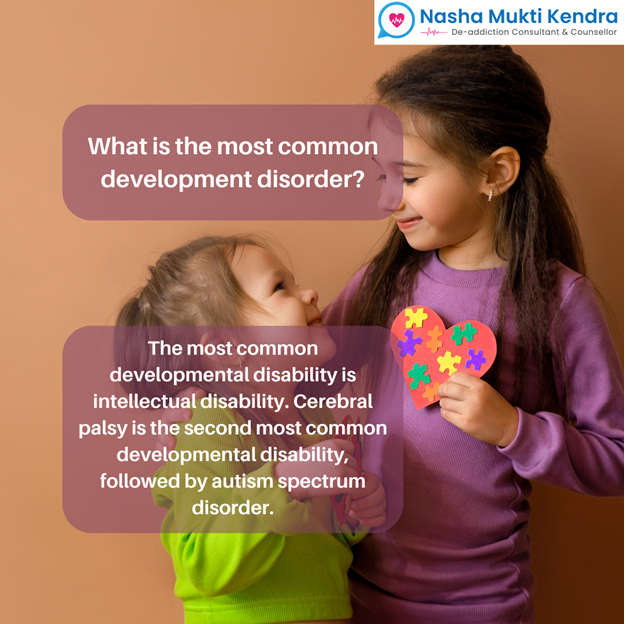A range of illnesses known as developmental disorders damage a child’s physical, cognitive, or emotional development. These disorders usually develop themselves in childhood and can have a substantial influence on a child’s everyday functioning, social interactions, and academic success. Understanding the various types of developmental disorders and the risk factors linked with them is critical for early detection, diagnosis, and support.
Types of Developmental Disorders
- Autism Spectrum Disorder (ASD): Autism Spectrum illness (ASD) is a neurodevelopmental illness characterised by difficulties with social interaction, communication, and repetitive behaviours. ASD patients may struggle with social cues, language development, and sensory processing.
- Attention-Deficit/Hyperactivity Disorder (ADHD): ADHD is a common behavioural disease marked by persistent patterns of inattention, hyperactivity, and impulsive behaviour. Children with ADHD may have difficulty focusing, staying organised, following directions, and controlling their impulses.
- Specific Learning Disorders (SLD): SLD is defined as difficulty acquiring and applying specific academic skills. Dyslexia (reading disorder), dyscalculia (mathematics disorder), and dysgraphia (writing disorder) are the most common forms. Children with SLD may struggle to read, write, or execute arithmetic skills.
- Intellectual Disability (ID): ID, formerly known as mental retardation, is defined by significant limits in cognitive functioning and adaptive behaviour. Individuals with ID may struggle with cognitive abilities, language development, and everyday life skills.
- Communication Disorders: These disorders affect a child’s ability to understand, express, or use language effectively. Common examples include speech sound disorders, language disorders, and stuttering. Children with communication disorders may have difficulties articulating sounds, understanding others, or using language appropriately.
- Motor Disorders: Motor disorders involve difficulties with movement and coordination. Conditions such as developmental coordination disorder (DCD) and Tourette’s syndrome fall under this category. Children with motor disorders may have challenges with fine or gross motor skills, balance, or controlling involuntary movements.
Developmental Disorders: Risk factors
Several risk factors can contribute to the development of developmental disorders. These factors can interact with genetic, environmental, and neurological factors, influencing a child’s developmental trajectory. Some common risk factors include:
- Genetic Factors: Certain developmental disorders have a genetic basis, with specific genes or gene mutations contributing to their occurrence. Genetic factors can influence a child’s susceptibility to conditions such as ASD, ADHD, and SLD.
- Prenatal Factors: Exposures and events during pregnancy can impact a child’s development. Factors like maternal substance abuse, infections, prenatal stress, and maternal health conditions may increase the risk of developmental disorders.
- Perinatal Factors: Events occurring around the time of birth, such as complications during delivery, prematurity, low birth weight, or oxygen deprivation, can increase the risk of developmental disorders.
- Environmental Factors: Early childhood experiences, such as exposure to toxins, trauma, neglect, or inadequate stimulation, can affect a child’s development and increase the risk of developmental disorders.
- Neurological Factors: Abnormal brain development or functioning can contribute to the occurrence of developmental disorders. Neurological factors may include structural abnormalities, neurotransmitter imbalances, or atypical brain connectivity.
Early identification and intervention play a crucial role in supporting children with developmental disorders. Early intervention services, individualized education plans, and therapeutic interventions can help mitigate the impact of these disorders, promote skill development, and improve overall functioning.
Understanding the different types of developmental disorders and their associated risk factors is vital for early identification and intervention. By providing appropriate support and interventions, we can help children with developmental disorders reach their full potential and lead fulfilling lives.
Get Quality Treatment From Nasha Mukti Kendra
When it comes to receiving quality treatment for various disorders, including those affecting children, Nasha Mukti Kendra is a trusted name. We are committed to providing comprehensive care and support to individuals seeking recovery from addiction and other related disorders. Our focus on the well-being and successful rehabilitation of our clients sets us apart.
At Nasha Mukti Kendra, we offer a range of therapeutic interventions and treatment programs tailored to meet the specific needs of each individual. We understand that children require special attention and care, which is why we provide Love & Care Therapy, also known as American-based therapy. This therapy approach emphasizes empathy, understanding, and unconditional positive regard, creating a nurturing and supportive environment for children to heal and grow.
Our team of top clinical psychologists, who are experts in their field, play a vital role in guiding individuals towards recovery. They bring extensive knowledge and experience to the table, ensuring that each person receives the best possible care. Our clinical psychologists work closely with clients, employing evidence-based techniques and personalized treatment plans to address their unique needs and facilitate lasting change.
Additionally, Nasha Mukti Kendra recognizes the importance of a holistic approach to treatment. We understand that recovery encompasses not only the physical aspect but also the psychological, emotional, and social well-being of an individual. Therefore, our programs integrate various therapeutic modalities, including individual counseling, group therapy, family support, and relapse prevention strategies. This comprehensive approach ensures that all aspects of a person’s recovery journey are addressed and supported.
By choosing Nasha Mukti Kendra, individuals and their families can expect to receive quality treatment in a compassionate and professional setting. We are dedicated to helping individuals recover from addiction and other disorders, especially children, through our specialized Love & Care Therapy and the expertise of our top clinical psychologists. Take the first step towards a healthier and happier life by seeking assistance from Nasha Mukti Kendra.
